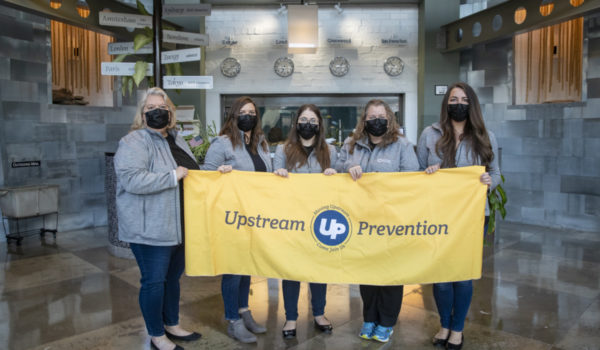
Southside organization heads to the root of challenging community issues
By Sara McAninch // Photography by Jana Jones
When you log onto Upstream Prevention Inc.’s website, you’re immediately greeted with a Saul Alinsky quote, plucked from Randall Shelden and Daniel Macallair’s “Juvenile Justice in America: Problems and Prospects.”
The quote is lengthy, but to paraphrase, when there are groups of people drowning in a specific problem, there are some who will nobly focus on direct rescue. Then there are others who will go upstream, to the root of the problems, to proactively find and resolve problems instead of fixing them reactively.
It’s a fitting quote for an organization whose mission is “to have a systems-level impact focusing on substance abuse prevention, mental health promotion and suicide prevention,” says Kathleen Ratcliff, founder and executive director at Upstream Prevention. “We know having an impact in these areas will have an impact downstream.”
Funded primarily through federal and state grants, Upstream Prevention is a southside-based nonprofit started in 2015 that provides training, resources and information to anyone in Johnson County, including educators, parents, youths, substance abuse treatment organizations, law enforcement and religious organizations, to name a few.
One of the primary aspects of its work is “about coalition building,” says Michelle McMahon, community coordinator for Empower Johnson County. “We want to change the community social norms. We want it to be positive.”
With a staff of five full-time employees, one part-time and an incoming summer intern, Upstream Prevention is a busy organization, with several programs and coalitions, including the above-mentioned Empower Johnson County, the Suicide Prevention Coalition of Johnson County and the Find Your Rock program. It’s also steadfast in its belief and messaging that mental health, and the stigma that often surrounds it, is just as important as an individual’s physical health.
Upstream Prevention
In April Upstream Prevention was awarded a three-year grant from the federal Substance Abuse and Mental Health Services Administration so the organization can provide evidence-based mental health awareness and training, called MHAT. As the project coordinator, Hope Thompson works with the community to deliver modules such as Question, Persuade, Refer (QPR) Gatekeeper for suicide prevention.
In the two-hour session participants see data about local and federal suicide rates, risk factors, how to recognize the signs if someone is suicidal, how to ask someone if they’re feeling suicidal, mental health resource referrals, and where to go for help, such as the suicide help line.
“If one person puts those things into action and saves somebody else, then that’s good enough for me,” says Thompson.
Her goal is to partner with local schools to do more about suicide prevention. While some already had QPR train-the-trainer sessions, she’d like to see this expand so trainees can teach others in their facilities. She’ll also be rolling out a youth suicide prevention curriculum called Mental Health First Aid – Youth. In the curriculum, school counselors provide classroom training to help teens learn how to ask their friends if they’re thinking about suicide, and how to identify, locate and engage the trusted adults in their environments.
Another big part of Thompson’s work revolves around raising community awareness about mental health. One way she does this is by collaborating with local businesses. One local coffee shop, for example, uses beverage sleeves with the suicide lifeline hotline number printed on them, and another coffee establishment has a suicide prevention poster in its window.
“I’m tired of the stigma around mental health. I want people to take care of their mental health just like they do their physical health,” she says.
Empower Johnson County
Funded through a 2016 five-year grant and run mostly by volunteers, the Empower Johnson County coalition addresses youth substance use through the 12 area representatives who work in their sectors. As one of the coalition’s founders, McMahon provides guidance and training, so the members have the necessary tools and resources.
“Our goal as a coalition is to enable these sector reps to go back into their field where they work and are involved in the community and for them to have the tools to prevent youth substance use,” says McMahon. “It’s all about coalition building and educating the coalition to make sure they have the tools and ability to make that impact on our mission.”
The coalition started through a community collaboration to specifically address youth substance use, including parents talking to their kids about it. As it evolves, Empower Johnson County’s goal is to reach every part of the county, even the more difficult to reach ones.
“I want Empower to be seen and known as the go-to resource for youth substance use and prevention, and education and awareness for parents so that they know how to have the conversations with their youth, and they know what to look for if they think there might be a problem or something going on,” says McMahon. She says that the biggest challenge is “making sure that we can fit into the entire county and they know that we’re here for them,” which includes overcoming some roadblocks to “really be a county-wide coalition.”
In April the coalition received a five-year grant that gives the organization an additional $50,000 per year from SAMHSA. The money is used to address underage drinking in the county through the federal Sober Truth on Preventing Underage Drinking Act grant. It focuses on alcohol use in youths under 20.
Suicide Prevention Coalition
Founded in 2019 the Suicide Prevention Coalition of Johnson County grew out of a joint effort between a system of care groups in the county. Upstream Prevention is the fiscal agent, so the coalition is housed under it. Primarily volunteer led, the association is on a mission to get the community “to address suicide prevention,” says Thompson.
Currently the coalition meets once per month and is a “boots on the ground way to tackle suicide prevention in the community,” says Ratcliff. She hopes to apply for grant funding in the future. According to Thompson, plans include trainings on topics such as QPR, self-care, mental health and suicide prevention.
Find Your Rock
In the last two years you may have noticed random painted rocks lying around when you’re out and about in Johnson County. At least some of them are courtesy of Upstream Prevention’s Find Your Rock program. The brainchild of the organization’s board, Find Your Rock was started with the belief that “sometimes people just need to smile a little bit,” says Ratcliff.
Rocks are painted bright colors and decorated with images and positive messages. Then they are tagged with a transparent sticker on the bottom that says #UpstreamPrevention to connect them back to the organization. Whether you paint rocks or find them, you are encouraged to use them as an avenue to talk about mental health and suicide prevention.
The stigma that often overshadows mental health, substance use issues and getting help is sometimes hard to overcome, but Upstream Prevention’s staff works diligently to change this.
“Upstream is about promoting positivity, but not everybody can be happy all the time, and we understand that. We all need help. In many aspects of our life, we all need it, and that’s OK. There’s nothing wrong with asking for help,” says McMahon.
The organization is trying to break down the stigma barriers by providing access to helpful tools and resources, and by consistently reinforcing the message that no one must face those issues alone and that everyone deserves to feel good.
If you’re struggling with feeling isolated due to mental health or substance use, Ratcliff says, “They’re not alone, and they deserve to feel good. They deserve to not feel alone and isolate, and there is help out there.”
Getting Involved
There are a lot of ways to get involved with Upstream Prevention, including joining a coalition, attending trainings and events, joining the Empowered Youth coalition, and/or donating funds. Empower Johnson County and the Suicide Prevention Coalition are “are always looking for people who are passionate about those topics,” says Ratcliff.
While the coalitions and trainings target county residents, the pandemic has expanded participation opportunities for people who live in other areas since the meetings and educational opportunities are now primarily hosted in a virtual environment. To find and register for upcoming events, go to upstreamprevention.eventbrite.com.
The Empowered Youth coalition works county-wide and is run by teens in Grades 8 to 12 who are the eyes and ears in schools regarding current issues and trends in mental health and substance use. Participants give feedback that guides the organization on areas for awareness-building and peer education. Coalition members commit to being alcohol- and drug-free while serving as a support structure for one another if someone feels pressured and wants support.
As a nonprofit, Upstream Prevention operates solely on grants, scholarships and donations. Donors can designate where their funds go within Upstream, or they can be applied where they’re most needed.
Learn more about Upstream Prevention Inc., connect with available resources and sign up for the newsletter at https://www.upstreamprevention.org/. For general information and inquiries, email [email protected]. You can also connect with the organization on social media at facebook.com/upstream.prev, @upstream_prev (Instagram), facebook.com/Hope4JohnsonCounty, and facebook.com/Empowerjohnsoncounty.


